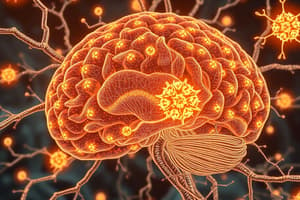Podcast
Questions and Answers
What are the indicators of a cooperative and friendly neuro assessment?
What are the indicators of a cooperative and friendly neuro assessment?
Maintains eye contact, speech clear and appropriate, oriented X3.
What does PERRLA stand for in a neuro assessment?
What does PERRLA stand for in a neuro assessment?
Pupils Equal, Round, Reactive to Light and Accommodation at 3mm.
What should be assessed in the neuro (M/S) evaluation?
What should be assessed in the neuro (M/S) evaluation?
Full ROM (range of motion) in neck, arms, and legs without pain.
What is considered a normal respiratory rate?
What is considered a normal respiratory rate?
What should the apical pulse be in a cardiovascular assessment?
What should the apical pulse be in a cardiovascular assessment?
What findings could indicate abnormalities in the GI/GU assessment?
What findings could indicate abnormalities in the GI/GU assessment?
What should the skin assessment reveal?
What should the skin assessment reveal?
What are the comments noted during the assessment?
What are the comments noted during the assessment?
Study Notes
Neuro (Psycho/Social)
- Patient exhibits cooperative and friendly demeanor.
- Maintains eye contact; speech is clear, appropriate, and at a normal rate.
- Oriented to person, place, and time.
- Self-reported feeling "in good health."
Neuro (Head & Neck)
- Facial symmetry observed.
- Pupils equal, round, reactive to light and accommodation (PERRLA) at 3mm.
- Occulomotor movements are even and coordinated.
- Equal hand grip strength noted; Hypoglossal (CN12) and Spinal Accessory (CN11) nerves function properly.
Neuro (M/S)
- Neck demonstrates full range of motion (ROM) without pain.
- Arms and legs show full ROM without pain.
- Dorsiflexion and plantar flexion are equal bilaterally.
- Lower limb abduction and adduction are equal bilaterally.
- Full muscle strength is present across all limbs.
Respiratory (RESP)
- Respiratory rate recorded at 16 breaths per minute, with normal depth.
- No shortness of breath while breathing room air.
- Patient can cough without experiencing pain.
- Tactile fremitus is present bilaterally; chest excursion is symmetric.
- Trachea is midline with no adventitious breath sounds noted.
- No wheezes, crackles, or rhonchi detected in lung regions, both anterior and posterior.
Cardiovascular (CV)
- Apical impulse located at the 5th intercostal space (ICS) in the left midclavicular line (MCL).
- Heart rate recorded at 72 beats per minute, with no reduction in sounds during S1 to S2.
- No murmurs, gallops, or clicks detected in any heart valves (aortic, pulmonic, tricuspid, and mitral).
- Carotid pulses are strong bilaterally with no bruits.
- All peripheral pulses are present and rated 2+: radial, brachial, dorsal pedal, and posterior tibial.
- No edema or varicosities present, with no calf tenderness noted.
- Jugular veins appear flat with no jugular venous distention (JVD) in supine position.
- Skin is warm, dry, well-perfused, with no signs of cyanosis.
Gastrointestinal/Genitourinary (GI/GU)
- Abdomen is round and symmetrical with midline umbilicus.
- Skin intact with no signs of striae, lesions, or scars.
- No masses palpated and no tenderness reported by the patient.
- Bowel sounds present and active in all four quadrants.
- Last bowel movement was on 12/11/15: long, brown, and soft with no straining.
- Last micturation also on 12/11/15: clear, not cloudy, yellow, with no abnormal odor.
Skin
- Skin is warm to touch, dry, and intact with no visible lesions, scars, abrasions, or bruises.
- Skin turgor is present with no tenting observed.
- Even distribution of hair noted; scalp appears normal with no infestations or dandruff.
- Mucous membranes in nares and mouth are pink and moist without lesions or redness.
- No redness above bony structures in head, thorax, or legs indicating potential pressure ulcers.
Comments
- No discomfort reported; patient remains comfortable throughout the assessment.
Studying That Suits You
Use AI to generate personalized quizzes and flashcards to suit your learning preferences.
Description
This quiz focuses on the comprehensive head to toe assessment documentation, including neurological evaluations for both psycho/social and head & neck components. Each flashcard covers key definitions and observations essential for accurate patient assessments. Perfect for nursing students and healthcare professionals looking to enhance their documentation skills.



